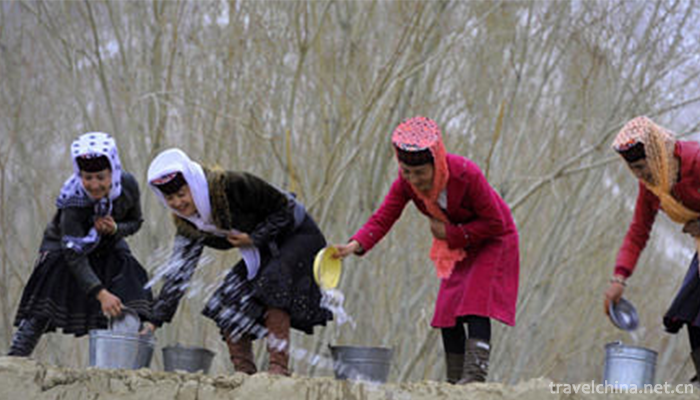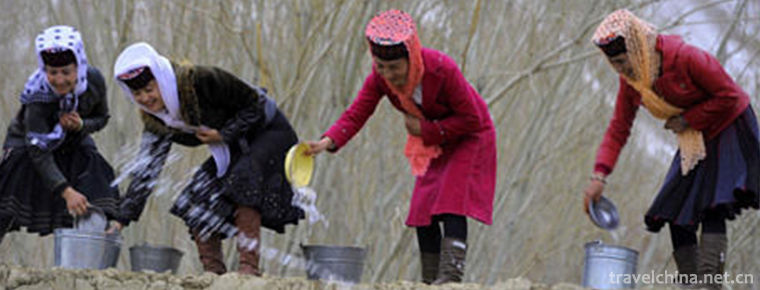Tajik Water Diversion Festival and Seeding Festival
Tajik Water Diversion Festival and Seeding Festival
Tajik Water Diversion Festival and Seeding Festival are national folk customs declared by Xinjiang Uygur Autonomous Region in 2006.
In Tashkurgan Tajik Autonomous County of Xinjiang, Tajik Water Diversion Festival and Seeding Festival are Tajik agricultural festivals. In Tajik, the sowing Festival is called "Hamozivast" and the water diversion Festival is called "Ziwar". The first day of spring sowing every year is the festival.
At that time, the whole village gathered in the fields to congratulate the beginning of spring sowing. Every household brought a little wheat together. The public selected a respected elder from the whole village to sow. The elected elder smiled and read words in his mouth. He carried the seeds one by one and scattered them on the people who had been waiting for them in the field. Everyone hugged their skirts, laughed and crowded around the seeds to express his congratulations on the spring planting. After sowing the seeds, a man led a fat and strong farming cattle to plow symbolically several times in the field, and sprinkled several wheat seeds to show the start of sowing. Then the cattle were fed pasta such as ploughshares and ploughshares to express their gratitude to the cattle.
It is said that on the sowing festival in the old society, people who lived in poverty and lacked seeds had to go out to inoculate seeds to relieve the urgent need. Now, sowing and vaccination is just a ceremony. The Tajik sowing festival also has the custom of splashing water on the guests. On this day, when a Tajik visitor comes to his house, when he leaves, a woman waiting outside the door with a basin of water sprinkles water on him as soon as she comes out.
Although water diversion Festival and sowing Festival are closely related to agriculture, they are also closely related to local natural conditions. Tashkurgan Tajik Autonomous County is located in the Pamir Plateau, with a cold climate, a sparse population and scattered residence. Under such natural conditions, it is difficult to carry out water diversion and sowing in spring by only one or two households. It is necessary to mobilize and organize all the men, women and children in the village to work together and unite and help each other to bring water in. When the water came in, the next day they plowed and sowed. In the meantime, people also help those who lack seeds. The purpose is to organize people to do a good job in spring farming production. The ceremony is held to pray for good luck and harvest, so that the whole village has food to eat.
The formation and development of water diversion Festival and sowing Festival are connected by the simple feeling of mutual assistance of Tajik people. The fashion of "helping others is proud and humiliating" is still of practical significance to the construction of a harmonious society.
Festivals and Sowing Festivals


-
1.Shanghai Happy Valley
Shanghai Happy Valley is located in the Songjiang Sheshan National Tourism Resort in the southwest of Shanghai. It is 40 kilometers from the central area of Shanghai
Time 2018-12-19 -
2.Lushan National Forest Park
Located in the center of Shandong Province, Lushan National Forest Park is an important scenic spot of Boshan Scenic Tourist Area, with its main peak at 1108.3 meters above sea level, the highest peak
Time 2019-02-06 -
3.The Ming Toms
The Obvious Tomb is located on Chunde Mountain, 5 kilometers northeast of Zhongxiang City, Hubei Province. It was built in 1519 in Zhengde, Ming Dynasty. It was built in 1566 in Jiajing
Time 2019-02-07 -
4.Yimeng Red Film and Television Base
Yimeng Red Film and Television Base, located in Changshan Villa, Ma Muchi Township, Yinan County, Linyi City, Shandong Province, was built in 2009. It is a comprehensive tourist area
Time 2019-03-03 -
5.Legend of Chen Sanwuniang
Li Jing Ji of Chen Sanwuniang is an ancient folklore, belonging to the legendary works of Ming Dynasty in China. The author has lost his life in Quanzhou (Chen Sang) of Fujian Province
Time 2019-04-16 -
6.Cutting Skill of Kaner Well
Kanerjing is the meaning of "well hole". It has been recorded as early as in Historical Records. It is called "well canal", while Xinjiang Uygur language is called "Kanerzi&qu
Time 2019-05-08 -
7.Miao Sister Festival
Miao Sister Festival, also known as "Sister Rice Festival", is a traditional festival of Miao people in Laotun and Shidong areas of Taijiang County, Guizhou Province. It is held from March 1
Time 2019-06-05 -
8.Printing and Dyeing Techniques of Nantong Blue Printing Cloth
Nantong Blue Printing and Dyeing Technology, one of the local traditional printing and dyeing techniques in Nantong City, Jiangsu Province, is one of the national intangible cultural heritage.
Time 2019-06-07 -
9.kylin dance
Kirin dance, also known as "Wu" Kirin, is a court dance performance of the Ming Dynasty in China. It was spread among the people when the Nanming Dynasty perished. When dancing,
Time 2019-06-10 -
10.Taoist Music of Xuanmiaoguan in Suzhou
The Taoist music of Suzhou, represented by the Taoist music of Xuanmiaoguan, belongs to the Zhengyi Taoist music, and is an integral art with the performing process of Zhai Yin Fa. It sings different
Time 2019-06-17 -
11.Xiuyan Jade Carving
Xiuyan Jade Carving, one of the national intangible cultural heritage, is a local traditional art in Xiuyan Manchu Autonomous County, Liaoning Province.
Time 2019-07-08 -
12.Suining climate
Suining City is located in the Asian monsoon area, belonging to the subtropical humid monsoon climate in Sichuan Basin. It has a mild climate, abundant rainfall, four distinct seasons and a significant monsoon climate. The frost free period is long in winter and spring.
Time 2020-12-16